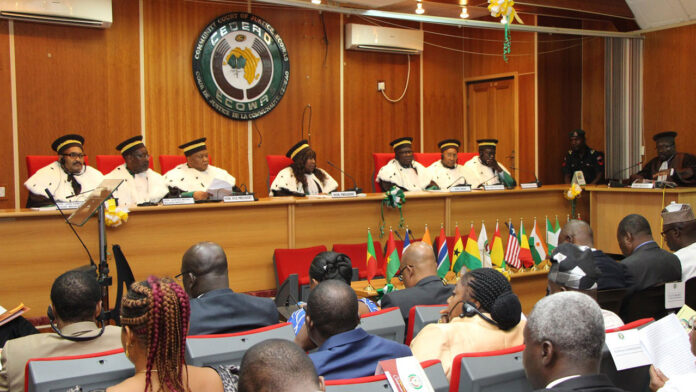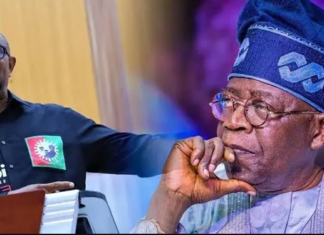By Jeph Ajobaju, Chief Copy Editor
A total 176 individuals have joined Socio-Economic Rights and Accountability Project (SERAP) to file a lawsuit against the federal government over the ban on Twitter pronounced by President Muhammadu Buhari on June 4
The government has threatened to arrest and prosecute anyone using Twitter in the country and has directed the Nigerian Broadcasting Commission (NBC) to order all radio and television stations to deactivate their Twitter handles.
The plaintiffs cited “the unlawful suspension of Twitter in Nigeria, criminalisation of Nigerians and other people using Twitter, and the escalating repression of human rights, particularly the rights to freedom of expression, access to information, and media freedom in the country.”
SERAP solicitor Femi Falana (SAN) filed the suit at the ECOWAS Community Court of Justice in Abuja on Tuesday, according to a statement issued by SERAP Deputy Director, Kolawole Oluwadare.
The suit seeks, among others:
“An order of interim injunction restraining the Federal Government from implementing its suspension of Twitter in Nigeria, and subjecting anyone including media houses, broadcast stations using Twitter in Nigeria, to harassment, intimidation, arrest and criminal prosecution, pending the hearing and determination of the substantive suit.”
The plaintiffs argue that:
· If the application is not urgently granted, Abuja will continue to arbitrarily suspend Twitter and threaten to impose criminal and other sanctions on Nigerians, telecommunication companies, media houses, broadcast stations and other people using Twitter in Nigeria.
· The suspension of Twitter is meant to intimidate and stop Nigerians from using Twitter and other social media platforms to assess government policies, expose corruption, and criticise acts of impunity by the agents of the government.
· “The free communication of information and ideas about public and political issues between citizens and elected representatives is essential. This implies a free press and other media able to comment on public issues without censor or restraints, and to inform public opinion. The public also has a corresponding right to receive media output.
· “Freedom of expression is a fundamental human right and the full enjoyment of this right is central to achieving individual freedom and to developing democracy. It is not only the cornerstone of democracy, but indispensable to a thriving civil society.”
· The arbitrary action by the government and its agents have negatively impacted millions of Nigerians who carry on their daily businesses and operational activities on Twitter.
· The suspension has also impeded the freedom of expression of millions of Nigerians, who criticise and influence government policies through the microblogging app.
· “The suspension of Twitter is arbitrary, and there is no law in Nigeria today permitting the prosecution of people simply for peacefully exercising their human rights through Twitter and other social media platforms.
· The suspension and threat of prosecution constitute a fundamental breach of the country’s international human rights obligations including under Article 9 of the African Charter on Human and Peoples’ Rights and Article 19 of International Covenant on Civil and Political Rights to which Nigeria is a state party.
· “The suspension has seriously undermined the ability of Nigerians and other people in the country to freely express themselves in a democracy, and undermined the ability of journalists, media houses, broadcast stations, and other people to freely carry out their professional duties.
· “A lot of Nigerians at home and abroad rely on Twitter coverage of topical issues of public interest to access impartial, objective and critical information about ideas and views on how the Nigerian government is performing its constitutional and international human rights obligations.
· “The implication of the decline in freedom of expression in Nigeria is that the country is today ranked alongside countries hostile to human rights and media freedom such as Afghanistan, Chad, the Philippines, Saudi Arabia, Zimbabwe and Colombia.”
The plaintiffs asked the court for the following reliefs: A declaration that
· The action of the defendant and its agents in suspending the operation of Twitter or any other social media and microblogging application without an order of a competent court of jurisdiction is unlawful, inconsistent and incompatible with Article 9 of the African Charter on Human and Peoples’ Rights and Article 19 of International Covenant on Civil and Political Rights.
· The act of the defendant in mandating its agent to commence and continue to regulate the social media in Nigeria amounts to restriction and censorship, thus violating Nigeria’s obligations under the African Charter on Human and Peoples’ Rights and Article 19 of International Covenant on Civil and Political Rights.
· The act of the defendant and its agents in suspending the operation of Twitter or any other social media and microblogging application in Nigeria without any offence known to law is incompatible with Nigeria’s international human rights obligations, and are therefore null and void to the extent of their inconsistency and incompatibility.
· The directive by the defendant, through the National Broadcasting Commission, directing and ‘advising’ broadcast stations to deactivate their Twitter accounts and discontinue its use is a breach of the citizens’ right to freedom of expression, access to information as well as media freedom, and therefore, null and void.
· The act of the defendant to frequently threaten Nigerians and other people who use Twitter and/or other social microblogging applications in Nigeria with criminal prosecution and the actual act of suspending the operations of Twitter in Nigeria, violates the principle that there is no punishment without law, and the right to fair hearing, and therefore, null and void.
They plaintiffs are also seeking an order:
· Setting aside the suspension, ban, sanction or other punishments whatsoever imposed on Twitter, Nigerians, media houses, broadcast stations and any social media service providers by the defendant and its agents.
· Directing the defendant and its agents to immediately revoke, withdraw and/or rescind their suspension or ban of Twitter and/or any other social media service provider(s) in Nigeria in line with Nigeria’s obligations under the African Charter on Human and Peoples’ Rights, the International Covenant on Civil and Political Rights and the Revised ECOWAS Treaty 1993.
· Restraining the defendant and its agents from unlawfully imposing sanctions and other punishment including criminal prosecution or doing anything whatsoever to harass Twitter, broadcast stations, Nigerians and other people and any social media service provider(s), and media houses who are Twitter users.
· Such further orders the court may deem fit to make in the circumstances of this suit.
No date has been fixed for the hearing.














